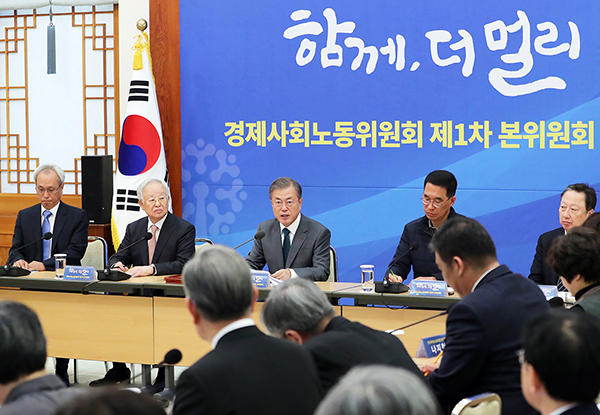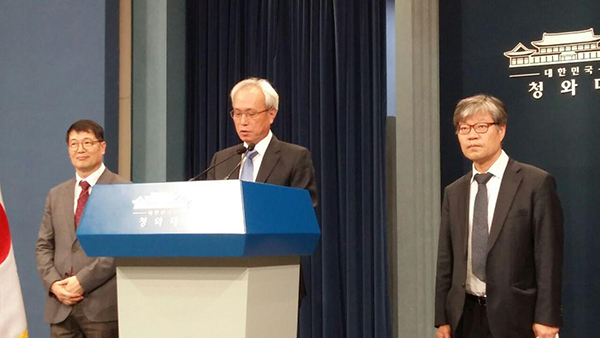
President Moon Jae-in said that "if the agenda related to the flexible working hour system is to be discussed at the Economic, Social and Labor Council, the National Assembly would await the outcome (of the discussion)", and continued that "I will make a request to the National Assembly for more time." President Moon's remark is interpreted that President Moon requested the National Assembly to slow down the legislation procedures to expand the flexible working hour system within this year, for which both the ruling and opposition parties are pushing ahead with, considering that the Economic, Social and Labor Council is expected to begin the discuss on the agenda.
President Moon said that "I would think the Economic, Social and Labor Council is a decision-making body rather than an advisory body," and stressed that "I will make all-out efforts that the agreements reached by the Economic, Social and Labor Council should be binding on the branches of the government."
The Economic, Social and Labor Council(ESLC) was officially launched with its inaugural meeting held at the Blue House on the afternoon of November 22. The launch took one and a half years since President Moon has made a promise to establish a new social dialogue body. The Korean Confederation of Trade Unions(KCTU), which has been participating in the tripartite top leaders' meeting - a precursor to the ESLC, did not join the inaugural meeting.
President Moon appointed 17 members of the 18-member plenary meeting of the Economic, Social and Labor Council, except one designated for the Korean Confederation of Trade Unions(KCTU) before opening the inaugural meeting: 4 members representing labor(one more to be added for KCTU); 5 members representing employers; 2 members representing the government(Employment and Labor Minister, and Economy and Finance Minister) ; 4 members representing the public interest, and 2 members representing the ESLC.
President Moon said in his congratulatory remarks that "labor relations is the crux of the pending labor issues like employment crisis, contingent workers, reduction of working hours, and basic labor rights as well as the restructuring of key industries," and added that "the economic agents need to come to an agreement in a broader framework to overcome the structural problems of low growth, growth without employment, polarization and economic inequality, low fertility, and the aging society."
President further requested to move towards the road of reform through the dialogue and compromise, saying that "I can assure the stance of myself and the government that the labor circle and the business circle are regarded as the partners of state affairs," and added that "the labor, employers and the government work together to build an inclusive nation through which the economy will be reinvigorated and the social polarization and employment problems will be harnessed."

Kim Ju-young, President of the Federation of Korean Trade Unions(FKTU) said that "it is right (for the government) to take a more prudent approach through a social consensus to the matters of policy-making which would significantly affect the country and the lives of all people," and stressed that "in the process of moving towards that direction, more discussions are necessary to address the problems of the minimum wage, flexible working hour system, and national pension, and the issue of the platform labor like the car-pool service deregulation conflicting with the conventional labor."
The Economic, Social and Labor Council adopted the comprehensive succession of the tripartite top leaders' meeting and the discussion outcomes in its first plenary meeting held on the afternoon of November 22. In accordance with the agreement reached by the tripartite top leaders' meeting, ESCL currently runs one special committee, four agenda-based committees and one vocation-based committee.
The meeting has also endorsed a plan to form and operate a new committee for the improvement of the working hour system for the discussion of the agenda related to working hours including the flexible working hour system. The timeline will be finalized through the consultation with the National Assembly, after the internal agreement when the committee is formed. ESLC Chairman Moon Sung-hyun said in his debriefing on the outcome of the plenary meeting at the Blue House that "a 9-member committee called the Working Hour System Improvement Committee including 2 each from the labor and employers will be formed as soon as possible and it will kick off the discussion right away."
The meeting has also adopted a recommendation for the KCTU's participation in ESLC, hoping that "KCTU would officially participate in ESLC at the earliest possible moment and (for the time being, nevertheless) temporarily participate in the various ESLC's committees until the end of January next year."
reported by Yon Yun-jung
translated by Kim Sung-jin

